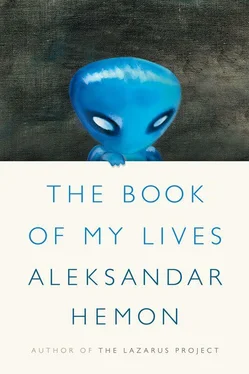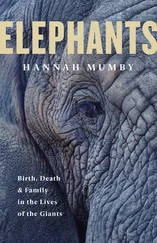Aleksandar Hemon
The Book of My Lives
FOR ISABEL,
forever breathing on my chest
I write fiction because I cannot not do it, but I have to be pressed into writing nonfiction. I’d like to thank the following people who pushed me to overcome my reticence and laziness: Slavenka Drakulić and Richard Swartz; John Freeman; Lee Froehlich; Sean Wilsey and the McSweeney’s crew; David Remnick and, in particular, Deborah Treisman, whose intelligence, wisdom, and kind touch helped a few difficult pieces come into existence. My editor, Sean McDonald, the Tony Soprano of New York publishing, has been a loyal and supportive friend, and also made me rewrite when I didn’t feel like it. My agent, Nicole Aragi, has by now become a de facto member of my family, so I normally express my gratitude to her by way of cooking — nevertheless, verbal gratitude is in order, as her patience, kindness, generosity, and a shockingly foul mouth have helped me through some very hard times. In addition to friendship and neighborly affection, Lana and Andy Wachowski provided me with a weeping office. My sister, Kristina, and my best friend, Velibor Božović Veba, have shared with me so much — not least their memories — that I can never thank them enough. My parents, Petar and Andja, have endured my childhood and adolescence and then lived to tell, becoming my friends and heroes in the process. Teri Boyd, my wife and partner, my forever and beyond, makes everything possible and endurable. Finally, my daughters, Ella, Isabel, and Esther, have graced all of my lives with love and meaning.
1. WHO IS THAT?
On the evening of March 27, 1969, my father was in Leningrad, USSR, in pursuit of his advanced electrical engineering degree. My mother was at home, in Sarajevo, deep in labor, attended to by a council of her women friends. She had her hands on her round belly, huffing and crying, but the council didn’t seem too worried. I was orbiting around her, exactly four and a half years old, trying to hold her hand or sit in her lap, until I was sent to bed and ordered to sleep. I defied the order so as to monitor the developments through the (somewhat Freudian) keyhole. I was terrified, naturally, for even if I knew that there was a baby in her stomach, I still didn’t know how exactly it was all going to work, what was going to happen to her, to us, to me. When she was eventually taken to the hospital in obvious and audible pain, I was left behind with terror-provoking thoughts, which teta-Jozefina tried to counter with the guarantees that my mother would not die, that she would come back with a brother or sister for me. I did want my mother to come back; I did not want a brother or sister; I wanted everything to be the way it was, the way it already used to be. The world had harmoniously belonged to me; indeed, the world had pretty much been me.
But nothing has ever been — nor will it ever be — the way it used to be. A few days later, I was accompanied by a couple of adults (whose names and faces have sunk to the sandy bottom of an aging mind — all I know about them is that neither of them was my father, who was still in the USSR) to retrieve my mother from the hospital. One thing I remember: she was not half as happy to see me as I was to see her. On our way home, I shared the backseat with her and a bundle of stuff they claimed was alive — that was supposed to be my sister. The alleged sister’s face was seriously crumpled, containing only an ugly, indefinable grimace. Moreover, her face was dark, as though she were soot-coated. When I traced my finger across her cheek, a pale line appeared under the soot. “She is filthy,” I announced to the adults, but none of them acknowledged the problem. From thereon in, it would be hard for me to have my thoughts heard and my needs met. Also, chocolate would be hard to get.
Thus my sooty alleged sister’s arrival marked the beginning of a tormentful, lonely period in my early development. Droves of people (bringing chocolate I couldn’t touch) came to our home to lean over her and produce ridiculous sounds. Few of them cared about me, while the attention they paid to her was wholly, infuriatingly undeserved: she did nothing but sleep and cry and undergo frequent diaper changes. I, on the other hand, could already read small words, not to mention speak fluently, and I knew all kinds of interesting things: I could recognize flags of various countries; I could easily distinguish between wild and farm animals; cute pictures of me were all over our house. I had knowledge, I had ideas, I knew who I was. I was myself, a person, beloved by everyone.
For a while, as painful as her existence was to me, she was but a new thing, something you had to get around to get to Mother, like a new piece of furniture or a wilted plant in a large pot. But then I realized that she was going to stay and be a permanent obstacle, that Mother’s love for me might never reach pre-sister levels. Not only did my new sister impinge upon what used to be my world, but she also obliviously asserted herself — despite having no self at all — into its very center. In our house, in my life, in my mother’s life, every day, all the time, forever, she was there — the soot-skinned not-me, the other.
Therefore I tried to exterminate her as soon as an opportunity presented itself. One spring day, Mother stepped out of the kitchen to pick up the phone and left her alone with me. My father was still in Russia, and she was probably talking to him. Mother did stay out of my sight for a while, as I watched the little creature, her unreadable face, her absolute absence of thought or personality, her manifest insubstantiality, her unearned presence. So I started choking her, pressing my thumbs against her windpipe, as seen on television. She was soft and warm, alive, and I had her existence in my hands. I felt her tiny neck under my fingers, I was causing her pain, she was squirming for life. Suddenly, I recognized that I shouldn’t be doing what I was doing, I shouldn’t be killing her, because she was my little sister, because I loved her. But the body is always ahead of the thought and I kept up the pressure for another moment, until she started vomiting curdled breast milk. I was terrified with the possibility of losing her: her name was Kristina; I was her big brother; I wanted her to live so I could love her more. But, although I knew how I could end her life, I didn’t know how I could stop her from dying.
My mother heard her desperate cries, dropped the phone, and ran to her aid. She picked my sister up, calmed her down, wiped off the curds, made her inhale and breathe, then demanded an explanation from me. My just-discovered love for my sister and the related feeling of guilt did not at all displace my self-protective instincts: I bold-facedly stated that she’d started crying and I’d merely put my hand over her mouth to prevent her from bothering Mother. Throughout my boyhood I always knew more and better than my parents thought I did — I was always a little older than what they could see. In this instance, I shamelessly claimed good intentions coupled with little-boy ignorance, and so I was warned and forgiven. There is no doubt I was monitored for a while, but I haven’t tried to kill Kristina since, loving her uninterruptedly.
The recollection of that sororicide attempt is the earliest memory in which I can observe myself from outside: what I see is me and my sister. Never again would I be alone in the world, never again would I have it exclusively for myself. Never again would my selfhood be a sovereign territory devoid of the presence of others. Never again would I have all the chocolate for myself.
Читать дальше












